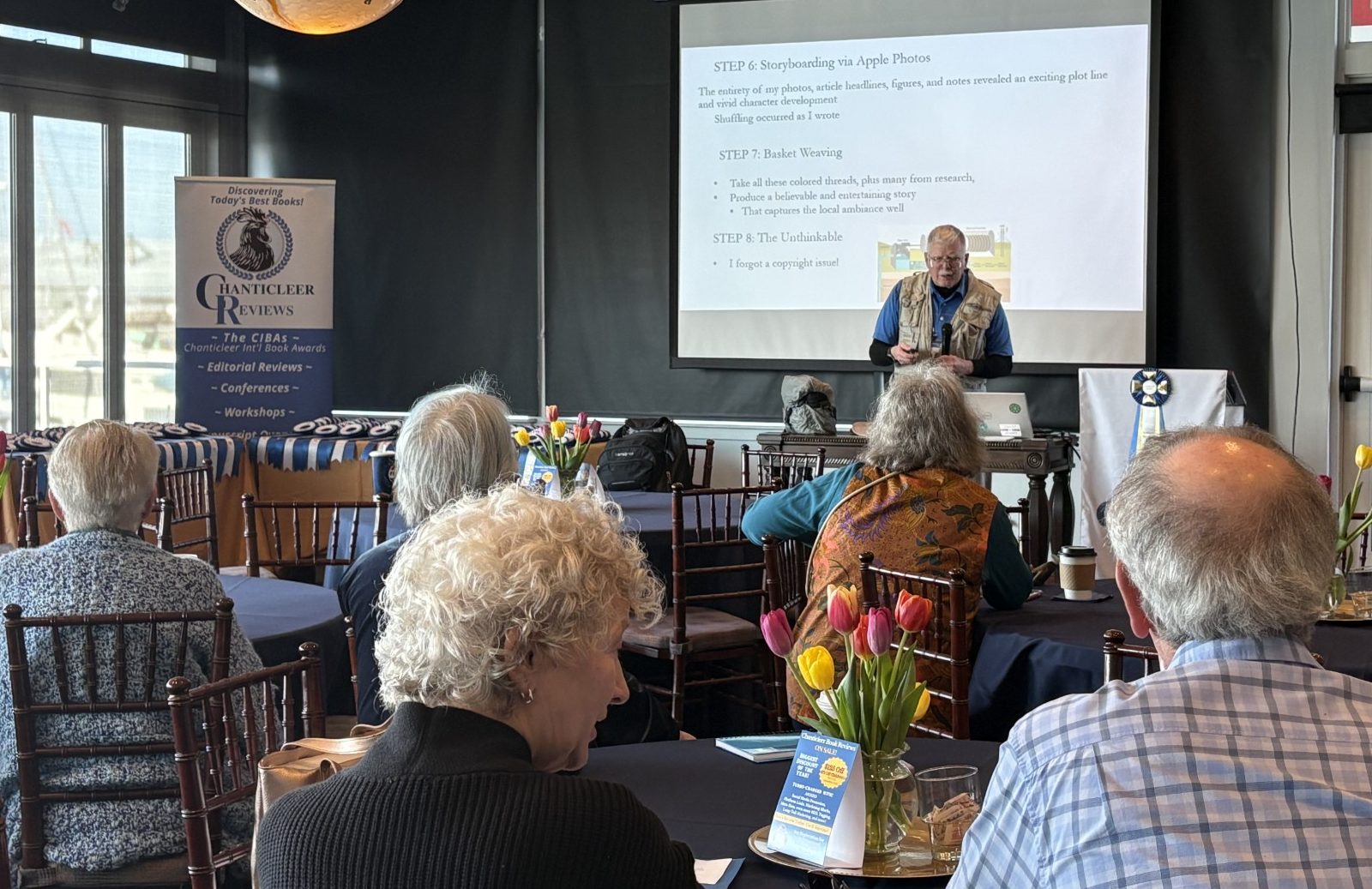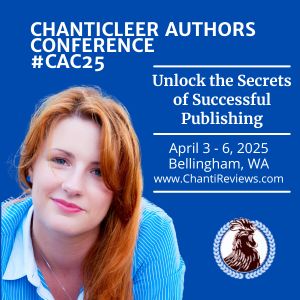|
Listen to or download this article:
|

Every Author Needs an Effective Website, But What Should You Do to Manage Yours?
Now is the time to freshen your website or seriously consider creating one dedicated to your author brand.
The internet is confusing enough without having to look at the back end of a webpage that’s supposed to draw others in. For many authors, their website will be the first thing online readers will come across, and it should represent the best parts of you and your work.
AUTHOR BRAND – Your website your reflects your author brand
Like a Resume, the Author Website should highlight what’s special about you
If your book receives a positive review or award, crow about it on your website. You can see Nancy Thorne doing that on her site here for her book Victorian Town, which won a First Place blue ribbon in the Dante Rossetti Awards. Having that digital badge can be the difference between someone purchasing your book and passing on it.
Where else will people find information about you?
Aside from your author website, most readers will find out about you from bookstores, social media, through your publisher, or through Reviews and Awards as described above.
The only place you fully control is your Author Website
The Bones (wireframe) of Your Website
These are the key subjects your author website should touch on for readers:
- Your AUTHOR BRANDING – this will be a blogpost to itself – please see links at the end of this article,
- What do you write – Fantasy? Historical Fiction? Non-Fiction? Children’s Books?
- Do you have an elevator pitch for each of your works? If so, this is where you put it. Then drill down with more info.
- What information or services you provide?
- Are you available to present?
- Are you available for Book Clubs? (You do have a Book Club page—right?)
- Do you promote/support any causes? Humane Society? Autism? Wildlife? Lover of Libraries? Board Games?
- Schedule of where people can meet you? Author Events, Wine Tastings/Lavender Days, Comic-Cons?
- Products (books) to sell –
- Can they be purchased directly from your website?
- Can they be purchased from your fav Indie bookseller? Amazon? Barnes and Noble? Bookchain?
- Kudos given your works
- Digital badges, links to awards and accolades
- Access to your Blog – it should be easily available AND with at least once a week posts.
- Blogposts do not have to be long – a short paragraph will do to keep it fresh and earning “browser love” i.e. ranking on search engines
- An outdated blog suggests that you are not interested in what you are doing (writing/written).
- BIO – why readers should READ your books rather than another author’s works in the same genre
- Please have easily downloadable photos, short and snappy bio with an invitation to contact you (see below) if a more in-depth one is needed, and graphics of your book covers available for those who want to promote you and your work. For example – you are going to do a book signing at your local bookseller – they will want to be able to create posters, social media posts, mailings, etc. and will need this basic info easily and readily available.
- Also, have links or a listing to where you have presented, been interviewed, and/or published, accolades and awards
- Contact info – Social Media Links, a secure way of contacting you, and a place to subscribe to your newsletter .
- Social media links – especially LinkedIn and Twitter
- Subscribe to your newsletter (yes, you read that correctly)
- Secure way of contacting you while allowing for your privacy

See our deep dive into social media here!
However you go about making your website, the first thing to check is that it’s presented cleanly. Simple is going to be better than an over complicated landing page with too many buttons to look at. There should be a natural progression to your website to help visitors navigate it with ease.
Also, it’s worth mentioning that Chanticleerian Rochelle Parry does a deep dive into this subject here here.
1. Communicating What you Write
Readers should automatically know what genre you write in when they look at your website. Ideally this is done with design and by saying it directly. Consider what images are important to the work you do and how you describe the genre of your work. Both should be front and center. Again, the design doesn’t need to be over the top or fancy, but rather focused on communicating directly to the reader to let them know if they’ve landed in the right space. For example, these are the first big buttons anyone who comes to ChantiReviews.com sees:
Obviously we consider our Newsletter, Awards, and Reviews to be fairly important. Ask yourself what the main purpose of your website is—selling books? Selling copyediting services? Providing reviews? Whatever that is, it needs to be the main focus.
2. About Page
This is where you’ll want a professional head shot and a little bit about you and your story. You can ease up on the advertising here, and talk more about why you’re passionate about the subjects you write about.

We’re all about giving this rooster some love here.
An author page that puts the author front and center is Janice S Ellis, PhD’s website here. You get a good sense of who Dr. Ellis is and the reason that she is a reliable authority for her books. A different route is to be a website that primarily highlights your book, like Avanti Centrae’s website here. You can see the difference in focus, especially since Dr. Ellis’s work tends to have a wider range of subjects, while Centrae’s focuses exclusively on VanOps novels and thriller series.
3. Books
Your books will undoubtedly be an important part of your author website. If you’ve won any awards, such as from our Chanticleer International Book Awards (CIBAs), you should include your digital badge to help the book stand out to those who visit your site. Likewise, if you’ve received a good Editorial Book Review from us, you’ll want to make a note of that and link to the review.
The goal is to show readers that your book stands out, and that it’s well connected enough to receive widespread recognition.

One of the biggest things we see with author websites is they forget to list those awards. Your website is a storefront among millions of digital storefronts, and something needs to be there to make your product stand out beyond what other authors have.
4. Contact
The Contact page is where you have a chance to let your audience reach out to you. It’s a great spot for people to request your presence at their book club, writing group, author’s conference, or upcoming Awards Ceremonies.
For example, the Chanticleer Authors Conference is coming up June 23-26, 2022 at the Hotel Bellwether in Beautiful Bellingham, WA. It’s a great place to make connections and expand your network to learn more skills to be a successful author!

Your Contact page is also an excellent place to gather information for your Newsletter. Your Newsletter lets you speak directly to your audience, cutting through the algorithms of social media and the whims of the internet to land directly in their inbox. Make sure you share information that’s fun and to the point of what might interest an audience.
5. Interact
If you have a blog and people interact with it, take a little bit of time to respond to them. Likewise, if you have emails from you contact page or responses from your Newsletter, you can take the time to let people know you heard them and respond in a positive way.

Your interactions may not be this cute
This is part of the business side of being a writer, so set up some dedicated time each week to deal with it rather than letting it bother you a little bit every day. Schedules can be the best way to avoid the death of a thousand cuts.
One of the big ways we promote interaction is through The Roost. The Roost is our personally curated social media site that allows authors to network and ask each other questions, while at the same time taking advantage of some extraordinary discounts. Learn more about The Roost here.
6. Avoid Sales Resistance
Sales Resistance is when the design of your website prevents readers from following you or buying your products. This is a huge personal pet peeve of Kiffer herself. To avoid this double check all your buttons and links, and even consider setting up multiple buttons for one product that your visitor can click on to buy your work. It can help here to have a friend explore your website and test it out. A second pair of eyes (or more) can’t hurt!

Hand in hand with that, share your brand! Promote your new book, promote new merchandise, and remind people of the services you offer If you have a new book? Advertise it! Win a new Award or receive a good review? Advertise it! Make sure it’s clear how to contact you, and that your SEO is up to date. What’s SEO you ask?
7. SEO and Publishing Alphabet Soup (How you and your works are found in the Internet of Things)
Possibly the most confusing element to the world wide web is the idea of Search Engine Optimization (SEO). Tags and Keywords are the first start to this. Rather than go with the first idea that comes to mind, so a little bit of searching. The word “raffle” has nearly 90 million searches on Google while “giveaway” has 335 million. Generally, you’ll want to focus on the one that’s more common. The exception to this rule is what makes you shine should be a keyword more unique to you. You can read more about SEO here.
SEO is all about driving traffic back to your website, and you can do this by referencing your website frequently and generously. Have it ready when people ask where to find you on podcasts or guest blogs, and double check to make sure that information is posted to send their audience back to you.
8. Social Media
Links to your social media help so much, because that’s a good way to stay in your reader’s mind throughout the day. You can link individually to your Twitter, Facebook, Instagram, and anything else, but what happens when you need to link to multiple sites (including your author website) from a space like Instagram?

No need to fear Social Media!
At the recent Chanticleer Authors Conference, VCAC21, Chelsea Bennett of LuLu and Alexa Bigwarfe talked about different ways to put up multiple links using Linktree and Shopify.
The big difference between the two is that Linktree is just for sharing links, whereas Shopify also doubles as a storefront, much like Squarespace, but it’s an all in one paid tool. If navigating multiple platforms is a challenge for you, Shopify may be worth the expense.
8. Newsletter
Your Newsletter is one of the best ways to connect with readers. Unlike social media, which is always filtered through automatic algorithms, people have signed up for and chosen to receive your newsletter. You don’t have to pay extra for it, just send it out to regularly tell your readers that you’re thinking of them, and to let them know how best to support you!
Newsletters can seem overwhelming, but you can break them down into a few simple steps. Here are a few possible choices:
- Recent Publications
- Status of Current Works in Progress
- What You’re Reading
- Writing Thoughts
- Links to your Social Media
You know yourself best, so choose what works best. The other big question with a Newsletter is how often to send one out. Luckily, the answer is you can send it out as little as twice a year. While there should always be a way for your readers to support you in the letter, it’s important that the main thrust of it is in connecting with them.

Your newsletter is a chance to give your books a big hug
What is the Author Website, in the end?
Your website is the hub of your part of the community of writers you’ve joined. It’s like a small inn where you invite readers in and can provide resources and support to your fellow authors. Be kind and excellent to each other.
Thank you for joining us and please stay tuned for the next Chanticleer’s Business of Writing Tools and Tips Article!

Save the Dates! June 23 – 26, 2022! Register Today!
Seating is Limited. The esteemed WRITER Magazine (founded in 1887) has repeatedly recognized the Chanticleer Authors Conference as one of the best conferences to attend and participate in for North America.
Join us for our 10th annual conference and discover why!
Thank you for joining us!

Writer’s Toolbox
Thank you for reading this Chanticleer The Business of Writing article.
Writer Toolbox Helpful Links:
Making Social Media Easier for Authors
Five Things Every Author’s Web Site Needs
AIOSEO – More than Alphabet Soup – Getting the MOST TRAFFIC out of your Website
The traditional publishing tool that indie authors can use to propel their writing careers to new levels? Read The Seven Must-Haves for Authors – Unlocking the Secrets of Successful Publishing Series by Kiffer Brown













Leave A Comment